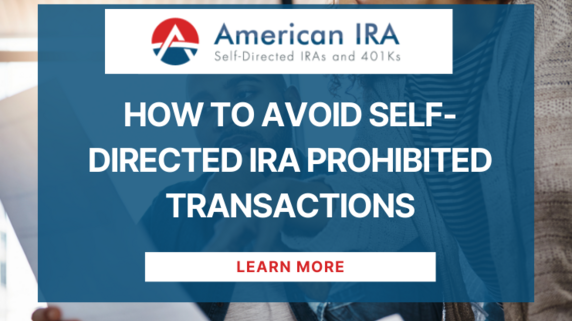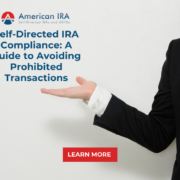How to Avoid Self-Directed IRA Prohibited Transactions
When you sign up for your first Self-Directed IRA, it’s easy to get caught up in all the opportunities. Finally, you have a way to use your retirement assets toward the investments you want to include. You can hold real estate. You can hold gold. You can hold private loans. You can even hold tax liens. But even though there are all sorts of options here, you can easily forget that there are also limits. They’re called prohibited transactions, and you’ll want to know what they are before you start investing. If you don’t, you could face stiff penalties and fees that eat into your returns. Let’s look at some of these prohibited transactions—and what you can do to ensure you stay within the bounds of retirement investing.
Start by understanding the triggers for Self-Directed IRA prohibited transactions. Among the prohibited investments are life insurance policies, certain precious metals, artwork, alcoholic beverages, and collectibles. And using your Self-Directed IRA or its assets as collateral for a loan, except for a non-recourse loan within the IRA, is strictly prohibited. In short, you have to make sure that you maintain the tax-protected status of your account by using it for legitimate retirement investments.
Equally important? Adhering to restrictions concerning prohibited individuals. We’ll put it like this: neither you, your spouse, your descendants or ascendants, nor their spouses, nor any entities under their control can engage in lending or borrowing transactions with your Self-Directed IRA. Disqualified individuals are also prohibited from buying or selling assets to the IRA. Additionally, neither you nor any disqualified individual can derive personal benefits from Self-Directed IRA assets. An example? You can’t live in a property your IRA owns, nor can anyone you know—even if they’re paying rent.
Maintaining compliance with these regulations may seem daunting at first. But with hard work and awareness, you can handle IRAs responsibly. Here are some proactive steps you can take to avoid prohibited transactions and safeguard your retirement savings:
- Educate yourself: Familiarize yourself with IRS regulations governing Self-Directed IRAs and prohibited transactions. Understanding the dos and don’ts will ensure you’re making responsible decisions.
- Consult a professional: Seeking guidance from a qualified financial advisor or tax professional specializing in retirement accounts can provide invaluable insights and ensure compliance with IRS rules.
- Do your homework: Before making any investment within your Self-Directed IRA, research the asset. Assess whether it fits within the confines of IRS guidelines. Conducting proper due diligence can help you reduce potential risks.
- Maintain “arm’s length” transactions: Avoid engaging in transactions with prohibited individuals or any entities they control. Maintaining arm’s length relationships and transactions within the IRA preserves its tax-advantaged status. Most of all, it will protect against potential penalties.
By proactively adhering to IRS regulations and being careful about your decisions, you can get the most out of your Self-Directed IRA. You can use it as intended. Remember: the key to maximizing the benefits of these accounts lies in responsible stewardship and compliance with regulatory guidelines. And a Self-Directed IRA administration firm like American IRA can help.
Stay informed. Seek professional guidance. Exercise due diligence in your investment decisions. This way, you can protect your retirement savings and explore the diverse opportunities these accounts offer. That’s how they’re designed—for you to have more freedom than the average retirement investor. But if you don’t stay within the confines of the Self-Directed IRA rules, your strategies will start to work against you.
Interested in learning more about Self-Directed IRAs? Contact American IRA, LLC at 866-7500-IRA (472) for a free consultation. Download our free guides or visit us online at www.AmericanIRA.com.







